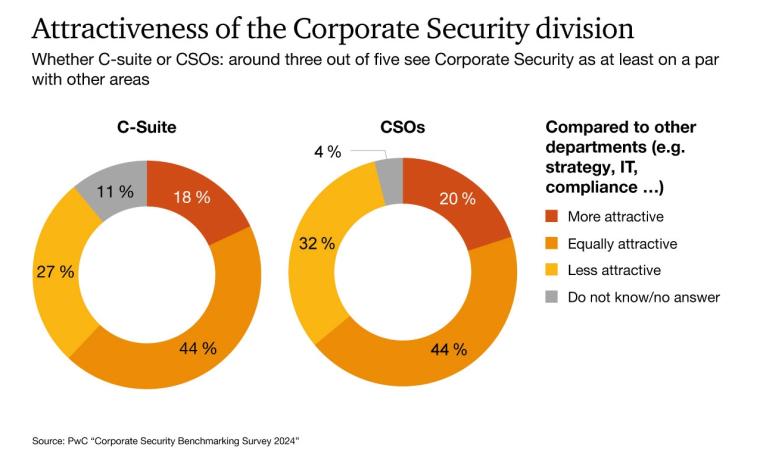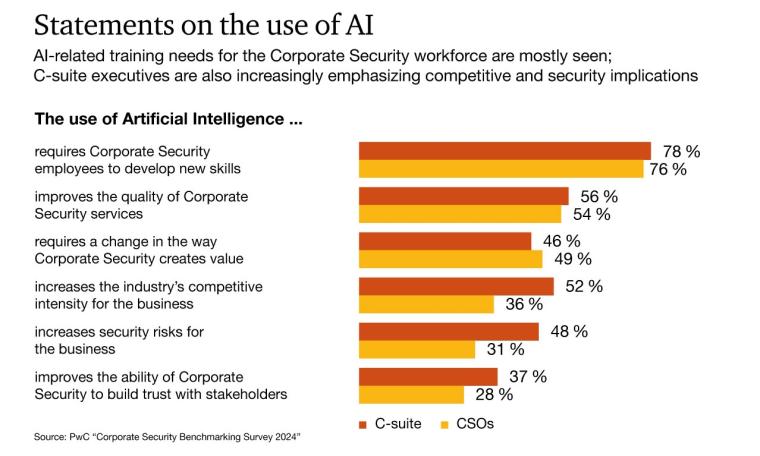Analysis of the Changing Role of the Corporate Security Department within Companies
Corporate Security has evolved from a reactive force to a proactive business enabler, especially in the current era of continuous crises. Jens Greiner, Director of Forensic Services at PwC Germany, highlights this transformation and offers three key recommendations in this guest article.
From the economic consequences of the Covid pandemic, tensions in the Middle East, and the war in Ukraine to the volatile dynamics of global trade: in uncertain times, security experts with foresight are needed who do not merely react to risks but anticipate them. This is the role that corporate security, as an interdisciplinary management function, can effectively fulfil. To find out how the perception of corporate security has changed within companies, we surveyed executives from 200 organizations: where do they see the greatest challenges for corporate security? How advanced are they in integrating new technologies such as artificial intelligence? And to what extent are they willing to take calculated security risks to seize opportunities?
Attractive to Young Talents
The results of our survey show that corporate security has increasingly moved into the focus of the C-suite. The reputation of corporate security has improved, and the role is increasingly recognized and valued as both a business enabler and a crisis manager. This also impacts the attractiveness of the function to young talent and, consequently, the future viability of corporate security: a career in corporate security is now at least as appealing to many young professionals as a career in IT, marketing, or strategy departments. There are several reasons why a position in corporate security is attractive: the work is seen as varied and meaningful, carried out in qualified teams within an international framework.

Companies Respond Cautiously to AI
A career in corporate security is also appealing because it is associated with the use of innovative technology. Just as in many other corporate areas, new technology and AI applications in particular will play a significant role in corporate security in the future – both positively and negatively. Half of the respondents believe that AI will improve the quality of corporate security services. However, there are also concerns: C-suite representatives in particular fear that the use of AI could pose an increased security risk to corporate security. This may be why companies are relatively cautious about adopting AI. The majority of respondents state that they consider the digital maturity of their corporate security to be sufficient and do not plan to implement additional technology. In an era where technological developments are rapidly evolving, companies adopting this mindset risk falling behind.

Risk-Averse Approach Dominates
Companies are also rather cautious when it comes to their general approach to security risks. The vast majority follow a risk-averse strategy: their primary goal is to reduce security risks and avoid uncertainties rather than consciously taking risks to seize opportunities. Only a minority of respondents are willing to embrace innovation and opt for solutions that may carry higher security risks but potentially offer greater benefits. The biggest current obstacle for corporate security in adequately fulfilling its tasks and responsibilities, according to companies, is the competing operational priorities and limited financial resources.
Take Action
What Do These Findings Mean for the Future of Corporate Security? From the study results, we can derive three recommendations for strong corporate security:
1. Increase the visibility of the function
- Corporate security carries significant responsibility within the company – to not only develop or maintain security levels, to quickly respond to security incidents or emergency/crisis situations, but also to accompany strategic business developments with security expertise. To achieve this, it must continuously communicate with other departments, address risks, and remain open to (new) solutions. It is therefore all the more important to continuously strengthen its visibility within the company.
2. Leverage the potential of digital solutions
- Corporate Security should analyze even more closely which solutions and technologies can become valuable tools in everyday operations. This is only possible if companies are open to new technology. The use of artificial intelligence in particular holds enormous potential to support employees in their daily work and to improve corporate security services.
3. Reevaluate your risk strategy
- Most companies apparently follow a risk-averse strategy: they focus on reducing security risks and choose the option that carries the lowest security risk. However, the downside of this approach is that those who always err on the side of caution may miss out on significant opportunities. Striking the right balance and sometimes daring to take calculated risks is needed here.
Role Consolidated – What Comes Next?
In summary, corporate security has made a significant step towards becoming a business enabler and has rightly moved even more into the spotlight of executive leadership. I am curious whether it will succeed in becoming a driving force in a potential realignment of corporate resilience management, where various security domains and resilience functions are united under a single framework, or at least whether the convergence of corporate security and cyber security can be further promoted. In both areas, strong corporate security can take bold actions and innovate.













